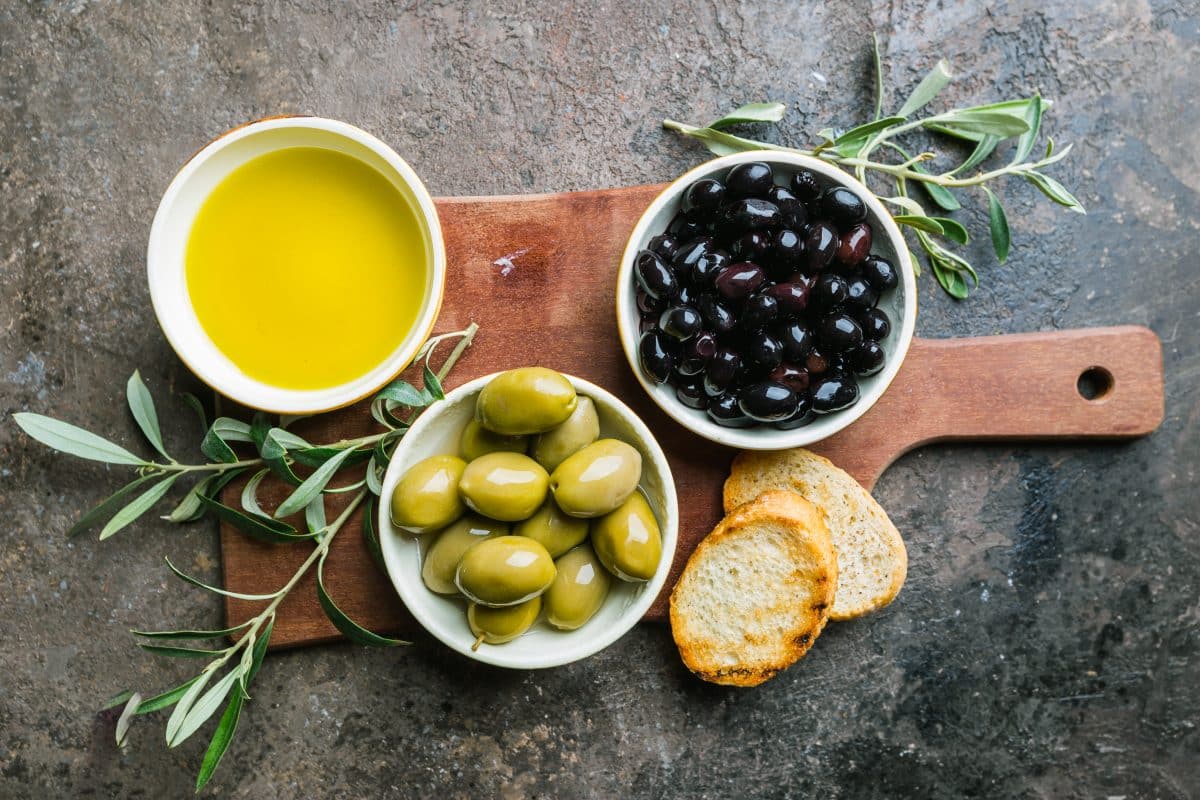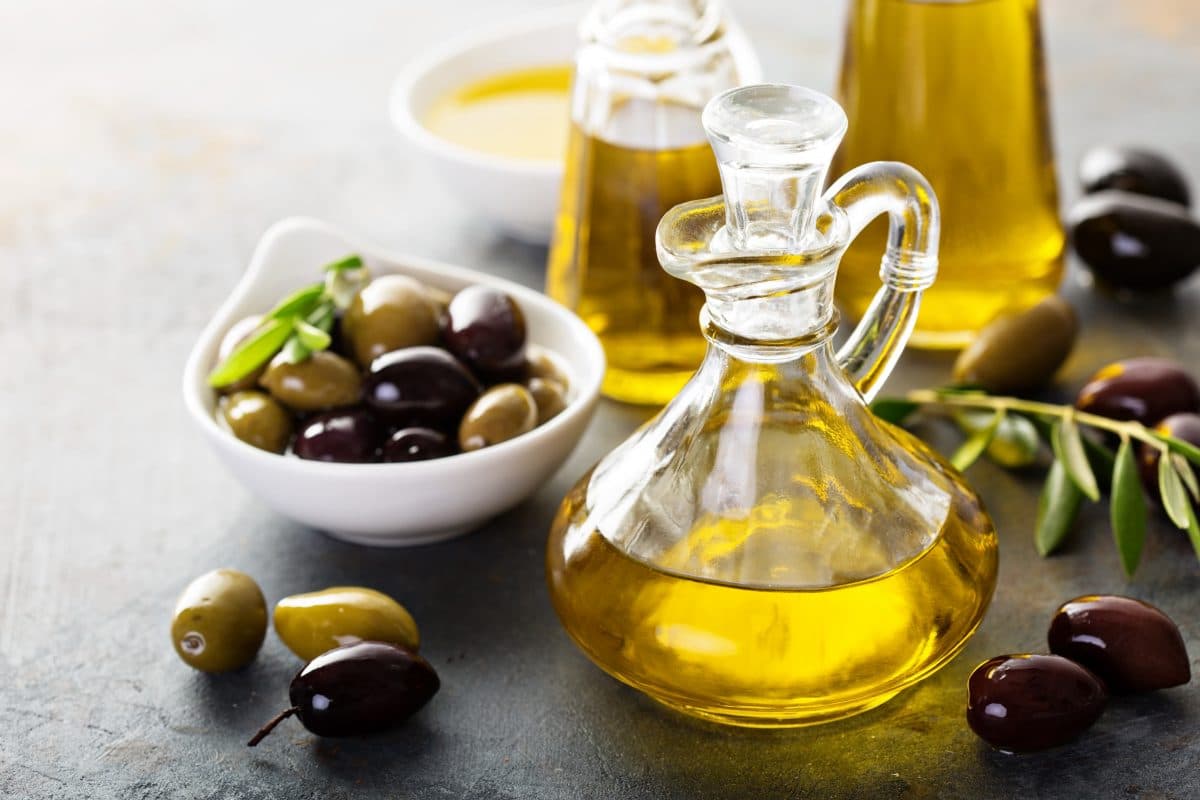What is the olive FODMAP content?
- Low FODMAP diet
If you are an olive enthusiast, you will be pleased to know that the olive FODMAP content is none.
This article will discuss the FODMAP content of green, black, kalamata and stuffed olives.
We will also explain the health benefits of consuming olives and give you some tips on including olives in your diet and low FODMAP recipes to try.

Are olives low FODMAP?
Yes! According to Monash, the authority on low FODMAP diet and FODMAP testing, olives are low FODMAP (1).
However, always check the label when buying olives to detect any added high FODMAP ingredients. The most common is garlic, which is high in fructans (1).
Fructans are a type of fermentable carbohydrate made from chains of fructose. If you suspect fructans to cause you digestive issues, read our article: “Fructans – are you intolerant to them?”
Green olives FODMAP content
Green olives are low FODMAP, meaning you can eat them freely while following a low FODMAP diet (1).
They are typically picked before they are fully ripe and turn black. This early harvest contributes to their distinct green color and slightly firmer texture.
Green olives are a versatile ingredient in various Mediterranean and Middle Eastern dishes. They are frequently found in:
- Salads
- Pasta dishes
- Pizzas
- Tapenades
- Cocktails as a garnish
Black olives FODMAP content
Black olives are low FODMAP as well (1).
They are fully ripe olives that have turned black on the tree. Black olives are left on the tree longer than green olives, allowing them to develop their characteristic dark color and slightly softer texture.
They can be used in the same dishes as green olives.
Kalamata olives FODMAP content
Monash has not tested kalamata olives so far. However, they are probably low FODMAP, like green and black olives.
Kalamata olives are large, almond-shaped olives with a deep purple to dark brownish-black color. They are often harvested at their peak ripeness, contributing to their characteristic dark hue.
Kalamata olives are known for their rich, fruity flavor and slightly tangy and robust taste. They are less bitter than other olive varieties.
They are often served as a table olive, used in salads, in traditional dishes like Greek salads and moussaka, and used as toppings for pizzas and sandwiches.
Stuffed olives FODMAP content
The FODMAP content of stuffed olives can vary depending on the ingredients used in the stuffing.
Stuffed olives are typically green olives that have been pitted and filled with various ingredients like:
- Cheese
- Garlic
- Peppers
If the stuffing contains high-FODMAP ingredients like garlic or certain types of cheeses, the stuffed olives may have a higher FODMAP content.
On the other hand, if the stuffing is made with low-FODMAP ingredients, the FODMAP content would be lower.
We suggest always checking the ingredients list and Monash app to avoid any IBS symptoms, such as:
- Abdominal pain
- Excess gas
- Diarrhea
To learn more about IBS symptoms, read our article: “What are the symptoms and causes of IBS?”
Olive oil FODMAP content
Olive oil is low FODMAP as it is pure fat and contains no carbohydrates (1).
However, it can have a mild laxative effect. Here you can read how to use olive oil for constipation.
Olive oil is a versatile and nutritious oil extracted from olives. It is renowned for its fruity flavor, distinct aroma, and rich golden-green color.
It is packed with monounsaturated fats, antioxidants, and essential nutrients, such as vitamin E (2).
Olive oil is a staple in Mediterranean cuisine and widely used for:
- Cooking
- Dressings
- Enhancing the flavor of various dishes

Is it OK to eat olives with IBS?
Yes, it is! Olives can add variety to your diet and enrich the dish with healthy fats and antioxidants.
However, you should be mindful when eating olives due to their high-fat content. High-fat meals can independently trigger IBS symptoms by extending the time through the intestines (3).
The same applies to olive oil. Even though it contains various nutrients, it should be consumed in moderation.
What are olives?
Olives are small, oval-shaped fruits that grow on the olive tree (Olea europaea). They have been cultivated in the Mediterranean region for thousands of years.
Olives are well-known for their culinary and nutritional value and their role in producing olive oil.
Olives have a unique taste characterized by their slightly bitter and salty flavor. They are typically brined or cured.
As a result, they can be pretty salty. Consuming them in moderation is essential, especially if you are watching your sodium intake.
Olives are widely used in Mediterranean and Middle Eastern cuisines, adding depth and flavor to various dishes, salads, and snacks.
Are olives good for you?
Olives are rich in monounsaturated fats, vitamin E, and other essential nutrients, making them a healthy addition to a balanced diet (4).
Olives are also rich in antioxidants, called phenolic compounds, which promote heart health and reduce the risk of heart disease, which was concluded by The European Food Safety Authority (5).
Polyphenols from olives defend heart health by (5):
- Preventing oxidation of LDL cholesterol
- Maintaining normal concentrations of HDL cholesterol
Low FODMAP recipes with olives
Olives can be served as an appetizer or a snack. You can easily add them to salads, pasta, bread, or sandwiches.
But if you need some inspiration on how to include olives in your diet, check those low FODMAP, quick and easy recipes:
- Low FODMAP Olive Tapenade
- Marinated Low FODMAP Mozzarella & Olives
- Low FODMAP Sauteed Radishes with Olives
- Quick Olive & Kale Pasta
- Low FODMAP Greek Salad
Summary
Olives are low FODMAP. This means they can be consumed according to your appetite. As always, check the label to detect any high FODMAP ingredient added to olives, such as garlic.
However, olives are a source of fat, and if you are an IBS sufferer, you should eat them in moderation to avoid IBS symptoms.
Olives and olive oil are regularly on the menu in the Mediterranean diet. They are rich in antioxidants, which protect against cardiovascular disease.
If you need ideas on how to include olives in your diet, check the recipes above.
Written by Barbara Lešnik, Student Dietitian, reviewed by Kirsten Jackson, Consultant Dietitian BSc Hons, RD, PG Cert